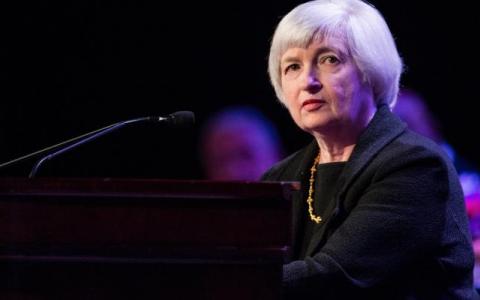
(Bloomberg) President Joe Biden’s economic plan is unlikely to create inflation pressure in the U.S. because the boost to demand will be spread over a decade, said Treasury Secretary Janet Yellen.
“I don’t believe that inflation will be an issue. But if it becomes an issue, we have tools to address it,” Yellen, the former Federal Reserve chair, said Sunday on NBC’s “Meet the Press.” “It’s spread out quite evenly over eight to 10 years. So, the boost to demand is moderate,” she said of the proposed spending.
Yellen also said the U.S. has the “fiscal space” to make investments in its economy, with interest rates low and likely to remain so, but over the long haul, budget deficits need to be “contained.”
Another top Biden administration economic adviser said inflation now apparent in certain pockets of the economy is “transitory” as the nation exits the pandemic.
Cecilia Rouse, chair of the White House Council of Economic Advisers, said supply chain issues and labor market shortages are “bumps along the way” to recovery.
There’s no sense for now that these price increases are becoming “de-anchored,” she said on “Fox News Sunday,” while promising to remain vigilant on inflation pressures.
“For the time being we expect at most transitory inflation, that is what we expect coming out of a big recession,” she said.
Yellen and Rouse spoke following last week’s unveiling of the latest economic plan from the Biden administration, which is proposing a combination of $1.8 trillion in spending and tax credits for areas such as education, child care and paid family and medical leave.
This would come on top of almost $2.25 trillion in infrastructure, home health care and other outlays that the administration proposed at the end of March, not to mention the $5 trillion that the government has injected into the economy through the three pandemic relief packages passed by Congress during the past 14 months.
The massive government spending has helped turbo-charge economic growth, and helped drive a stock market rally to record highs. U.S gross domestic product increased at an annualized rate of 6.4% during the first quarter, the Labor Department reported on Thursday. Personal consumption surged at an annualized rate of 10.7%, the second-fastest since the 1960s.
Commodities Surge
As the U.S. and other major economies rebound from the pandemic, prices for everything from copper to oil have skyrocketed. Meanwhile, a key measure of consumer prices, known as the personal consumption expenditure price index, rose 2.3% in March from a year earlier, marking the largest jump since 2018.
These increases have some experts worrying about inflation, including former U.S. Treasury Secretary Lawrence Summers, who told Bloomberg Television on Friday that the Biden administration’s spending plans could overheat the economy.
Lawmakers, including GOP Senator Susan Collins of Maine, have made similar comments.
Powell Not Panicked
Federal Reserve Chairman Jerome Powell shrugged off such concerns last week, telling reporters that the reopening of the economy may lead to a single episode of price increases, but not a long-running bout of inflation.
Yellen said on that while the administration needs “fiscal space to be able to address” emergencies like the pandemic, it needs to do so with a long-term plan in mind.
“We don’t want to use up all of that fiscal space, and over the long run deficits need to be contained to keep our federal finances on a sustainable basis,” she said.
Asked about the proposed tax increases that would come with Biden’s spending plan, Yellen focused on the U.S. proposal for a global minimum corporate tax, and efforts to clamp down on tax loopholes in the U.S.
“An important way of paying for this is increasing tax compliance,” she said. “It’s estimated that underpayment of taxes that are really due is costing us, the federal government, about $7 trillion over a decade.”



